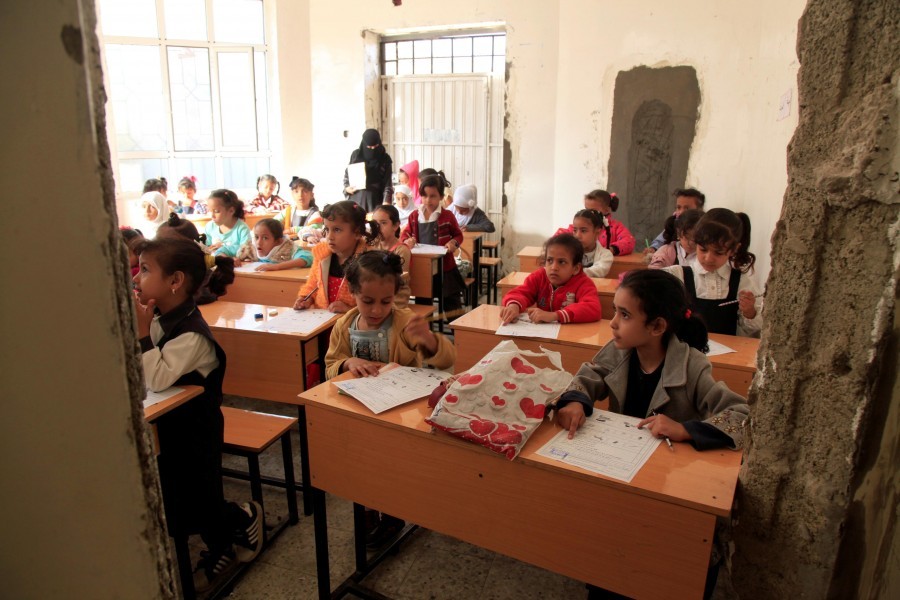
Published :
Updated :

The number of precocious children in the country is negligible. Few parents bother about them. They are happy if their babies can, somehow, cross the bar of school admission tests. Some do it at ease. There is also another side of the coin. In spite of the urban middle-class society being internet-savvy, a lot of students cannot shake off the dread of sitting among unknown boys or girls. The classroom atmosphere and the teachers' movement appears strange to them. A few even feel scared, and remain seated in a dazed state. As the babies return to their parents after the test, some literally crying, the guardians heave a sigh of relief.
The whole scene looks as if these little boys or girls have been pushed into the wild to pick a mythological flower, and bring that to the worried parents. With the current pandemic times in perspective, most of the admission-seeking students have already spent more than seven months indoors --- veritably in a forced confinement. They have found few outlets to release their inner urges to spend time in ways they like. Appearing in a crowded admission test could be compared to the state of being alone on an unknown shore. On the other hand, the exam being the first test in their mundane life is a hard truth. It only adds to the budding students' bewilderment. Finally, the onus happens to be lying with the parents. It's them who have assiduously groomed their offspring to appear in the admission tests. Viewing the whole episode of these tests, the ongoing spells of uncertainty make many feel troubled.
This year being an extraordinary one, lots of academics bring into question the standard of judging merits of the admission seekers. The post-shutdown school-based academic activities were expected to begin with a hectic, vital curricular exercise --- admission of child students. But to the woes of the teachers and parents, the lately shaky procedures had passed through phases of speculations and uncertainties. The indecisions and ambivalence, as a consequence, prompted lots of otherwise enthusiastic kids to experience astumble at the very beginning of their career. It could have been avoided by turning to pragmatism, a well-thought-out plan for the future and an in-depth appraisal of the present realities. Sadly enough, those were conspicuous by their absence. Although it may sound crude and harsh, many feel tempted to return to a grim observation: Children should not be turned into guinea-pigs of a nation's vast academic sector.
The saga began with the speculations about setting of the admission test dates for private and public schools. The speculations are over now. The Ministry of Education issued a notice on November 12 on yet another stretch of extension of the school and other educational institutions' shutdown --- till Dec 19. The last extension was in place for up to November 14. With the latest shutdown extension, originally beginning March 17, the country's schools, and other academic institutions, are set to remain non-functional for over nine months in total. The inordinately long closure has been prompted by the government's resolve to save students from being attacked by the Covid-19 virus. But the tiny tots have already had their share of traumas. However, similar scenarios are also seen in many developed, middle-income and poorer countries.
The latest shutdown extension has been viewed by teachers and parents as quite worrying, especially people directly dependent on schools for the career uplift of their studentsand children. The extension comes at a time when parents around the country have been beset with anxieties over the admission of child students to schools, both private and public. The worries have mainly centred round the methods of the admission tests.
A glimpse of the feared chaotic school scenarios could be gleaned from newspaper photographs. One such photograph the other day has shown the extent of the brazen flouting of corona-time mandatory health guidelines. It shows the frightening view of unmanageable teenage students in front of a renowned city school on November 11. The students of classes VI-IX had been seen jostling at the school gate to submit their assignment papers to the school authorities. A number of parents also accompanied them. Almost the similar spectacles may have been encountered in front of the other renowned schools. It was frightening to notice in what style of reckless abandon, the mandatory rule of physical distance had been thrown to the wind.
The scenes are preceded by the semblance of taking classes online despite the fact that around 70pc of the students in the cities and villages remain deprived of the high-end facility. The experts dealing with school-level education cannot remain inactive in these critical times facing the country's students. According to a section of them, it is the new students, i.e. the babies from Play, Nursery to Class-1 on whom the impacts of the ongoing deadlock are set to be felt quite acutely.
A large number of these future learners may have been in the process of being prepared by their parents and relatives. The children may have also visualised their coming days to be spent at school. All societies in the past and present are used to enjoying or passing through mixed feelings as their children are being groomed for school admission. The joy of being a father or a mother of a child who comes out successful in the now-challenging admission test has few parallel. On the other hand, the parents of unsuccessful students consider themselves to be the most unfortunate. The children also feel dejected at their parents' displeasure. The very fact that a pandemic-fuelled impasse has been created in the education sector, that of the children especially, has emerged as a formidable challenge before the nation.Experts suggest that both society and the government continue to sharpen their sensitivity towards children.


 For all latest news, follow The Financial Express Google News channel.
For all latest news, follow The Financial Express Google News channel.